Text
The show also touches on power as well. My boy Foucault probably wrote somewhere about using a "inferior" group of people to force the normal population to behave themselves so that they don't get demoted to that inferior status
Assassination Classroom
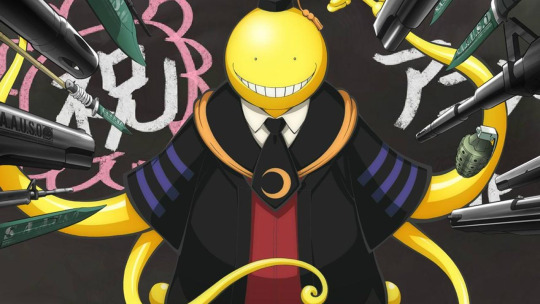
This was a pretty cute show honestly. I thought that the episodes were pretty entertaining, and despite the show being about students having to kill their junior high school teacher, it's overall a very heartwarming and pleasant show. I've heard great things about it but hadn't watched it until now.
As for analysis of it, I think that the main thing that is easy to pick up on for this series is discrimination. We can see that class E is discriminated against because of their past of not being the best students in school, which has led to them being on an entirely different campus from the rest of the school, while also being ostracized and bullied whenever they are with the rest of the school for assemblies. However, we can see that Koro-Sensei is able to teach the students that they all have their own strengths and can be successful if they apply themselves correctly. I think this calls back to the message of Eden of the East, where it showed the NEETs that they were able to be productive members of society if they applied themselves correctly. For Assassination Classroom, the students were able to overcome the best class in the school, Class A. It's an overall very uplifting message about finding your own strengths and using them to the fullest in order to be as successful as possible.
One other thing that I'm not sure of it the show was trying to comment on or not, but the main character (who is a male) looks like a female (at least to me they did. They're very androgynous looking). I think that this can show performativity of gender, since without seeing the clothes they wore and knowing they were male, you could mistake them for female.
Overall, solid show. May have to watch the rest of it some other time.
19 notes
·
View notes
Text
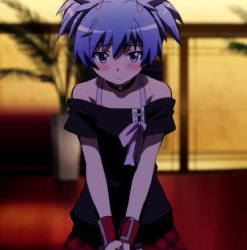
I thought that show was okay. I don’t really have any strong opinions about it. Funnily enough, Assassination Classroom was the first manga I read in middle school because a friend brough the first volume to class, and she let me read it. After that, I never continued reading or watching the show until now.
I think the show sells itself with its really interesting concept, but it starts to drag on a bit. As the story progressed, the initial thrill of the unique concept of Assassination Classroom faded for me. While the idea of a class of students tasked with assassinating their alien teacher was intriguing at first, I felt that the show lost some of its momentum as it shifted its focus towards the students' education rather than the assassination aspect. The early introduction of Karma, a talented and ruthless student, added a level of excitement and intensity to the show, but as the story went on, the assassination attempts became less thrilling and lacked the same level of intensity.
I also found myself getting bored with the repetitive nature of the story. The formulaic approach of the students coming up with various plans and strategies to assassinate Koro-sensei or new characters appearing to help assasinate Koro-sensei became predictable and lost its appeal. I do still appreciate the exploration of the main cast and how they develop over time, but Koro-sensei’s backstory gets neglected most of the time. I thought that the introduction of Koro’s “brother,” was really interesting, but we don’t get much more lore about Koro himself. The show feels like it’s stuck in a repetitive loop, but I will finish the rest of season 2 eventually, so I hope it will be good.
6 notes
·
View notes
Text
I also wanna note that many anime try to show their main characters gaining the power to overthrow the government, but Cyberpunk takes a more realistic approach of a group of people who are just trying to survive in an unmerciful. They have zero chance of changing the system, so they have to resort to escaping, like with Lucy's dream.
Cyberpunk Edgerunners
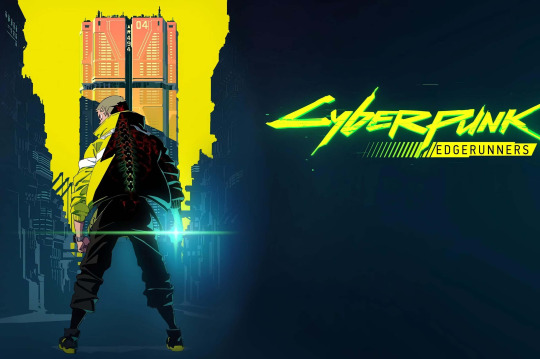
We really poppin off with the class suggestions huh.
This show was actually such a banger, but I was pretty sad that David ended up dying in the end. I do believe that the ending is a bit better with David dying for Lucy, and then we get to see Lucy live out her dream of going to the moon, but it's still pretty sad.
I think that it's clear the overall theme of the story is discrimination and overcoming it (which is why I was extra sad with David because he's had such a shitty life and ended up still dying young). We can see from the very beginning of the show that David comes from a single parent home and is very poor, as they can barely afford to pay to wash their clothes. His mother dies as a result of a criminal heist or attack or something gone wrong, which leaves David to fend for himself and forces him to commit to a life of crime in order to get by, but also to rebel against the society that has put him in this position.
The show clearly shows the problems that many disadvantaged people in society face, and I believe that it urges us to try to do more to help them. It is not David's fault that he was born into poverty, and despite being a gifted student he had to resort to more shady methods because they were more cost efficient. And despite the characters being criminals, I would argue that some of them (very strong emphasis on some), are better people than the corporate minds that seem to run the society. This class divide is very prevalent for much of the show, and I think that thematically the show was pretty well done.
Animation was beautiful, characters had distinct designs, music was also very good. Overall, really good show.
4 notes
·
View notes
Text
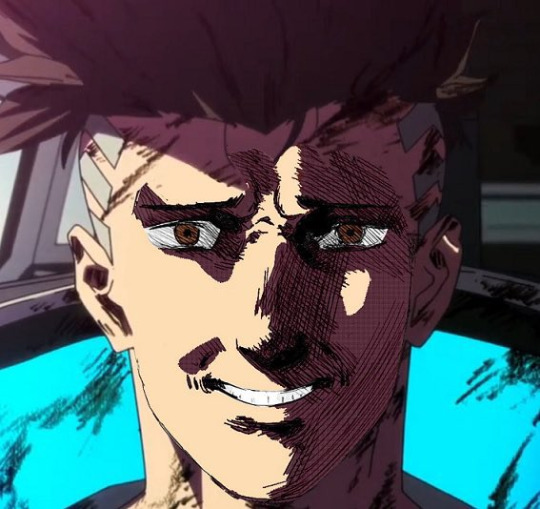
This is gonna be a hot take, but I actually don’t like the show that much. I can recognize that it’s still pretty good, but I felt that we weren’t able to spend enough characters to make many of their deaths feel truly meaningful. Pilar���s death really just came out of nowhere, mostly serving as a way to move the plot forward. Also, Maine’s fall into cyber psychosis only occurred during the span of a single episode. If we had gotten to see an entire arc where Maine kept trying to get new implants despite his growing insanity, just like what happened to David in the end, it would make both of their deaths so much more significant. Like I said, I don’t think that show is bad. In fact, the last arc is one of the best pieces of fiction I’ve ever seen, but I’m just sad that the series could have been so much more.
As with nearly all cyberpunk works, the show presents a speculative world that results from late capitalism. When businesses and profit reign supreme, it leads to massive social stratification, as shown by the different lives that David has to live compared to his high-class students. David is forced to pirate, his mother is forced to engage in illegal activities to make a living, and when David’s mother is horribly injured during a crossfire, he isn’t able to pay for her healthcare.
It's also important to note Lucy's desire for exteriority. Her dream is to go to the moon, far away from the capitalist dystopia of Night City, but the moon has simply become a tourist destination for more people to exercise capitalism. When she finally makes it to the moon in the final scene, she isn't happy because it seems as if all her efforts had been for nothing, having lost everyone that was close to her.
The show effectively portrays the harsh realities of a dystopian future where access to basic necessities such as healthcare is determined by wealth and privilege. This portrayal aligns with the cyberpunk genre's overarching theme of societal inequality resulting from uncontrolled capitalism and corporate control. It highlights the vast disparity between the rich and the poor, where the mega-corporations hold immense power, and the lower class struggles to survive, often resorting to illegal activities to make ends meet.
6 notes
·
View notes
Text
If you enjoyed this movie so much, you'd definitely enjoy all of Satoshi Kon's other movies. Like I said, the dude's a GOAT, and he writes some of the best stories.
Perfect Blue

Despite the movie being only 81 minutes long including credits, and not being one of the things I voted for, I'm actually really glad it was chosen because this movie was a banger.
I've always sorta been a fan of psychological thriller type movies, even though I think some of them get a little too into the psychological part where it ends up making no sense unless you bend over backwards and jump through some hoops. But this movie was perfectly fine, and I found it to be super entertaining. The ending was really wild and I actually loved the twist ending.
As for analysis, I think that it's pretty clear the movie is taking a look at celebrity/pop idol culture and exposes some of the stresses involved with it as well as some of the problems celebrities face. We can see that Mima's psyche deteriorates over the course of the entire film, which causes her to not only hallucinate about committing murders, but also not be able to discern from filming her TV show and reality. The movie does a pretty good job of this, and while sometimes it can get a little confusing, I felt that overall it was done in a way that was still pretty easy to somewhat understand what was going on. A lot of psychological thrillers will have a scene towards the end of the movie where it shows what was really happening while the main character was hallucinating, but I've never really liked those except for very rare circumstances.
We can also see that relevant to some of our class discussions, the film comments on obsessive fan culture and the dangers of it. We can see in the film that there are multiple characters that are obsessed with Mima, being the one rapist character (I forget his name), and the main antagonist of the movie, Rumi. I believe that the film tries to show the audience the danger of becoming too obsessed with a specific celebrity, as it can cause you to literally do things that end up negatively affecting the celebrities own psyche. While Rumi clearly has some sort of mental disorder that causes her to act this way, I think it's still interesting that the film decides to deal with it.
Lastly, a large part of the film is about blurring the lines between fiction and reality. Throughout the movie, we are unable to tell if some parts are real or not, which shows us the true psychological impact that the stresses of work life are having on Mima. I think it's a very effective way of storytelling, and I thought it was done well in this movie.
Pretty good.
7 notes
·
View notes
Text
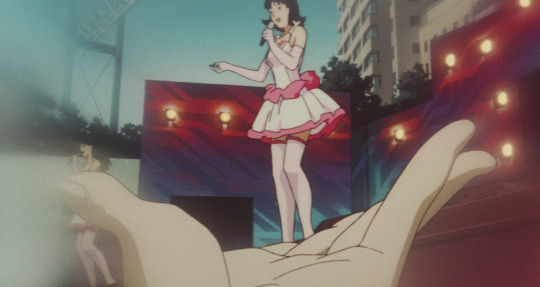
^^ a perfect shot
This is my third time watching Perfect Blue, and it’s still a straight banger. Directed by the GOAT, Satoshi Kon, this anime film is absolutely mind-blowing, and it’s one of my favorite anime movies of all time.
What I love about Perfect Blue is how it messes with your mind. The story follows Mima, a former J-pop idol, who's trying to make it as an actress but is haunted by her past. The film blurs the lines between reality and illusion, and it's so intense and suspenseful that it keeps you on the edge of your seat the whole time. The final twist and chase scene goes so crazy, and it’s the perfect climax.
The direction of the movie is also top-notch. Satoshi Kon is a genius when it comes to storytelling. He uses visual cues, symbolism, and changes in perspective to create a sense of unease and uncertainty. The pacing is spot-on, with quiet moments of introspection followed by wild and surreal sequences. The animation is also stunning, especially for a movie that came out during the 90s. The visuals are vivid and dynamic, adding to the overall intensity of the film. One of my favorite shots is when the stalker in the beginning seems to be holding Mima in his hand.
One thing that stands out in the movie is how it explores the dark side of the entertainment industry. It delves into the pressures of fame, the loss of identity, and the consequences of pursuing one's dreams. It's a thought-provoking commentary on the price of stardom and the sacrifices that come with it. Another amazing modern manga/anime, Oshi no Ko, tackles similar themes of exposing the entertainment industry, and it’s clear that Oshi no Ko has taken a bit of inspiration from Perfect Blue. Moreover, Satoshi Kon's impact on the film industry cannot be overstated. He's known for pushing the boundaries of storytelling and animation, and Perfect Blue is a prime example of his genius. His use of visual metaphors and symbolism adds depth to the narrative, inviting viewers to interpret and analyze the story in multiple ways.
7 notes
·
View notes
Text
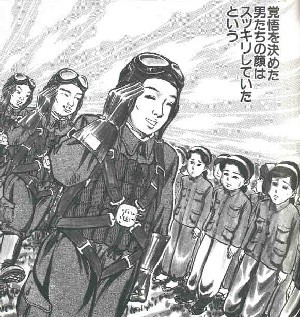
As I read through Sensouron, I couldn't help but feel like I was reading more of a manifesto with illustrations than a traditional manga. The full title itself, "Neo Gōmanism Manifesto Special - On War," was indicative of the author's intent to convey a specific message. However, while the manga was certainly intriguing, it left me with mixed feelings and raised questions about its intent and validity.
One of the most striking aspects of the manga was its strong sense of Japanese nationalism. The author attempted to downplay Japan's past atrocities during World War II, which raised concerns about its potential as right-wing propaganda. The manga seemed to be portraying Japan in a positive light, while painting other countries, particularly the United States, in a negative one. This one-sided perspective left me questioning the author's motives and the reliability of the information presented.
Moreover, the manga highlighted the complex nature of wars and the absence of clear "good guys." While the author attempted to downplay Japan's war crimes, it was clear that other countries, including the United States, have also engaged in similar propaganda efforts to protect their governments and prevent citizens from turning against them. This raised questions about the authenticity and objectivity of historical narratives, as governments often manipulate information to serve their own agendas. As the adage goes: history is written by the winners.
Additionally, the manga brought to light the issue of government distrust, both in Japan and the United States. It was evident that the author was attempting to shape readers' perceptions and influence their opinions through the manga's narrative. However, history has shown that such propaganda efforts are not always effective in the long term, as people become increasingly skeptical of government actions and narratives (I don’t know if it’s like this in Japan, but US citizens have been growing in their distrust). This made me reflect on the importance of critical thinking and fact-checking in evaluating historical events and narratives.
3 notes
·
View notes
Text
I also thought the office metaphors were a bit overblown. When I started reading it, I thought it might be some sort of slice-of-life office thing, but then the author started expositing on a bunch of stuff that happened during WWII, and that's when I realized this manga isn't really a story but just a manifesto
Sensoron
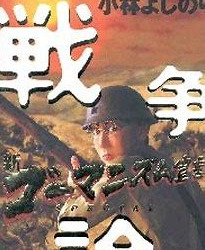
This manga was... something else. I thought it seemed so crazy when reading it... like it was clear that it was right wing propaganda (or at least, it seemed to me that way. Maybe what they're saying is actually true but I'm going to say probably not.)
The manga clearly stems from a strong sense of Japanese nationalistic pride, and trying to make Japan not seem as bad for some of the atrocities committed during WW2. It attempts to downplay, refute, and retort any claim that would hurt the right wing narrative.
In the reading, one thing that the author mentioned was that there are multiple times of war, not just wars fought on the battlefield. This made me think of some of our conversations at the beginning of the year about soft power vs. hard power. While many conflicts and disputes are typically thought of as being settled with battles and guns and murder, the power to influence and put thoughts in people's minds is also a very valuable asset, one that this manga was clearly trying to use. It was trying to make the readers believe in this overarching grand narrative that the right wingers in Japan were trying to peddle.
Something else that I thought was really interesting with this text is how they tried to equate simple disputes at an office with these large global issues of mass genocide, rape, and war crimes. I guess the author was trying to explain it in a way that would make the audience able to see the point he was trying to make, but I don't think someone taking too long in the toilet is equivalent to war crimes... I think there are some things that can be made a much bigger deal than others.
Overall, I feel like this reading continues our conversation about power, while also highlighting international relations in particular. Being from America, I'm not necessarily completely aware of the true nature of the relations between Japan and China and Korea (although some of friend's parents have very strong anti-Japanese sentiments), and reading this helped show me HOW BAD it really is. Like man there is just history denying, accusations of war crimes, fabrications... it's crazy.
2 notes
·
View notes
Text
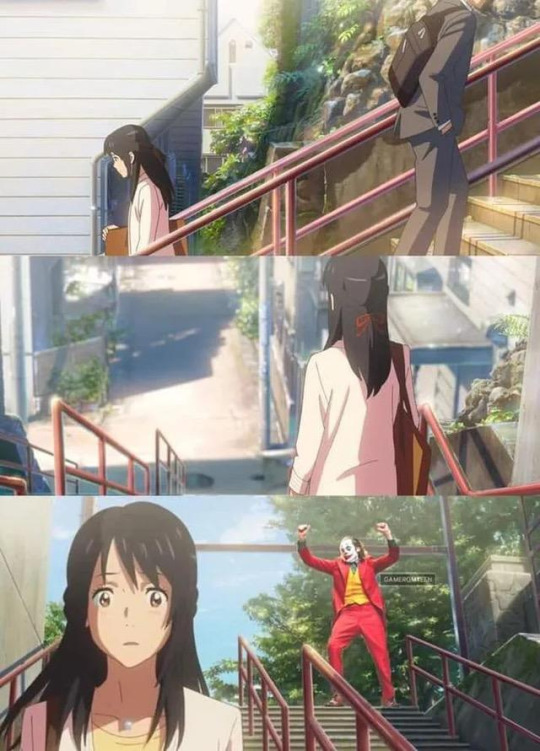
As much as I like Shinkai Makoto and his films, I’ve never really thought of them as masterpieces, or anything. Sure, they’re pretty solid movies, but I wouldn’t say they ranked among the best of the best in anime or just movies in general. Still, I did quite enjoy Your Name despite having watched it a couple of times before. The music especially hits hard.
One of Foucault's key concepts in "The History of Sexuality" is the idea of power dynamics and how power operates in society. Foucault argues that power is not simply held by individuals or institutions, but rather it is pervasive and operates through various social mechanisms and discourses. In "Your Name," we see how power dynamics operate in the context of gender and sexuality. In the film, the main characters, Taki and Mitsuha, frequently switch bodies and inhabit each other's lives. They experience a disorientation of their identities and bodies, leading to a blurring of gender boundaries. This can be seen as a reflection of Foucault's notion of the fluidity and constructed nature of gender and sexuality. Foucault argues that gender and sexuality are not fixed and natural categories, but rather social constructs that are shaped by societal norms and discourses. "Your Name" challenges the traditional notions of gender and sexuality by depicting them as malleable and subject to change.
Furthermore, Foucault argues that power operates through surveillance and control. In "Your Name," the characters are constantly under surveillance, both by each other and by their social environment. They have to navigate the expectations and norms of their respective genders and conform to social roles. This surveillance can be seen as a manifestation of societal power that regulates and controls individuals based on their gender and sexuality.
The film also touches on the theme of memory and its relationship to identity and power. As Taki and Mitsuha switch bodies and lives, their memories of each other and their past experiences become a crucial aspect of their connection. Foucault argues that memory is a social construct that is shaped by power dynamics, and it can be used to control and manipulate individuals. In "Your Name," memory serves as a means of connection and liberation for the characters as they strive to understand their identities and history beyond societal constraints.
3 notes
·
View notes
Text
In terms of sexuality, the movie has a lot to say about the nature of gender as social constructs, by literally depicting a gender swap, in which the two main characters have to act own a completely different gender role from what they're used to
Your Name
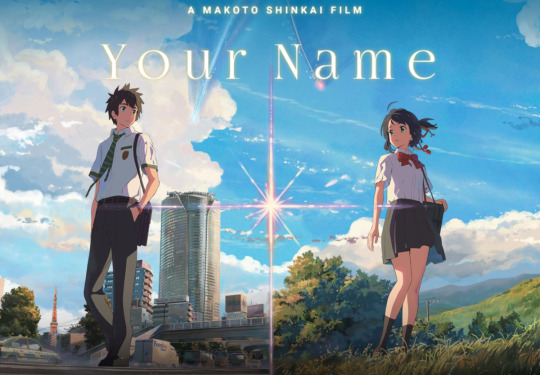
Many of my friends have wanted me to watch this film for a long time, but I never wanted to because I'm not really a guy that's into romance movies. But, having now watched it I actually kind of wish I watched it earlier. I really enjoyed the movie (even if there were some moments that were maybe a little odd).
Now just going to address the elephant in the room. Did Taki basically sexually assault Mitsuha every time he switched into her body? Yes. Do I think that it was mainly for comedic effect and not necessarily something the audience should dwell upon because it would divert from the message of the movie? Also yes.
I think that the main message of the movie is all about the power of love. Specifically, that love is able to triumph over anything. I know that it's a common expression, but this movie decided to take that to the literal. I mean, Taki and Mitsuha LITERALLY changed the past by saving all of the villagers from the comet and therefore altering the future to make the comet incident not as disastrous. It's an interesting theme for the movie to explore, and I feel like dealing with fate usually leads to interesting conversations. Is there such a thing as fate? Are there things we can do to change/alter fate itself? It's a theme that is heavily explored in the series Berserk (which content wise is like the complete opposite of this film), and I always find it interesting.
The other main thing I noticed in this film goes back to our discussions of sexuality. We see that when in each other's bodies they make each other act more masculine and feminine respectively, but it actually has positive impacts on their lives. Taki is able to get a date with the girl he had been crushing on, and Mitsuha becomes a lot more popular and taken seriously at school. The film shows the positives of not just fitting into stereotypical societal gender roles.
Overall, a pretty good movie. I would say probably the best movie we've seen this year for class.
4 notes
·
View notes
Text
Nice catch on the essentialism. In addition to the comedy, it also provides some commentary by showing the absurdity of some stereotypes that are rarely true
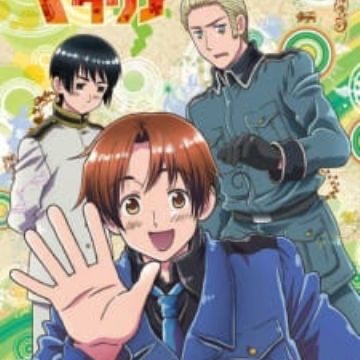
This show was really interesting. It did actually make me laugh out loud a few times (I watched the English dub for those who are wondering), and I thought that splitting each episode up into 5 minute increments was super interesting. I’m not gonna lie, sometimes it felt like nothing of substance was really happening in the episodes.
Overall though, I found it to be pretty enjoyable. I’m a big history guy, so seeing all of the historical references throughout was actually pretty cool.
As for some analysis, I found it really interesting that the whole basis of the show is taking countries and making a singular character embody all of the people. A wholistic generalization of a population. Essentialism, if you would. I thought that this was really interesting, since it calls back to some of the topics we talked about at the beginning of the semester. Each of the characters are caricatures of the stereotypes that are common for each specific country (for example Italy is lazy, America is overly enthusiastic and proud, Germany is very orderly and tough). I feel like some people could see the show as racist because of this because it is actively perpetuating these stereotypes and conflating them to be true of an entire country of people. However, I believe that the show is trying to make FUN of this point of view. Most satires poke fun at the thing they are making fun of (which in Hetalia’s case is the various countries of the world), however many other satires also poke fun at specific actions or ideologies by making the audience realize that said action/ideology is so illogical or stupid that it’s kind of funny if you were to take it seriously.
This was definitely the most unique show I e ever seen. I’ve seen plenty of other shows that are satirical in nature, but never any that were this fast-tempo’d.
3 notes
·
View notes
Text

I kind of went into this anime thinking it might be a little cringey, but I was pleasantly surprised by how funny this anime was. There were quite a few banger gags, but for some reason, none of them made me laugh as hard as when Italy yelled, “Pastaaaaaaaa!” in the first episode. I did a lmao in real life. From then on, I knew this show was gonna slap.
Personally, I think Hetalia does a great job of utilizing national stereotypes without making it too offensive. Even though the series puts heavy focus on the Axis Powers (it’s in the title, after all), it was a good move to avoid mentioning war crimes. It definitely helps keep the lighthearted tone. The series never takes itself too seriously and is not afraid to poke fun at its own characters. For example, the character representing Italy is portrayed as being lazy and cowardly, while the character representing America is depicted as being overly enthusiastic and brash. By highlighting these flaws, the series invites viewers to think critically about national stereotypes and their consequences.
In addition to its comedic elements, Hetalia Axis Powers also provides insights into the complex dynamics of international relations. The series portrays how different countries interact with each other, often through alliances and conflicts. I even learned a few cool historical things from the series, such as when the US planned to dye Mount Fuji red as a form of psychological warfare. It sounds like something an insane supervillain would do.
4 notes
·
View notes
Text
I feel that the game does an excellent job at balancing all its different themes from the environmentalist message to the discrimination. You can really tell that there was a lot of effort put into all the world building and the story.
Xenoblade Chronicles 2
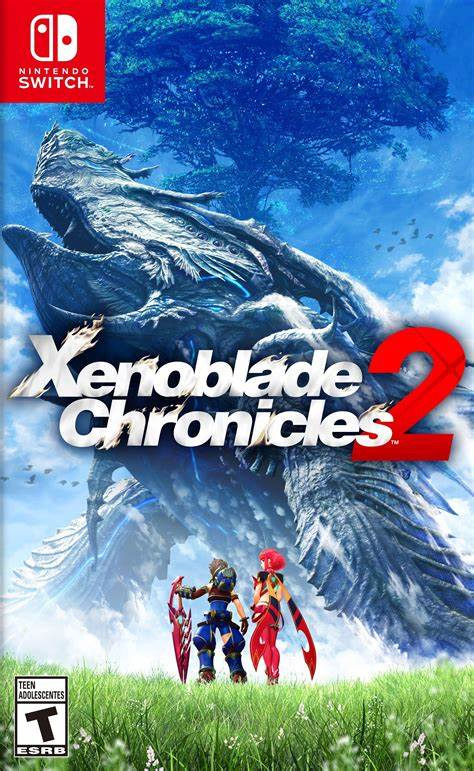
Watching roughly 3 hours of video game cutscenes felt like it took years off my life, but I found the game to actually be pretty entertaining to watch all the way through. Sure, we skipped some cutscenes and I'm missing some of the context, but overall the game had a pretty interesting world and story. I loved the designs of the characters in this game, they were all very distinctive and cool (Jin is MY GOAT).
But enough about my surface level thoughts, let's get into what I thought this game was trying to say. To me, there seemed to be two prevalent themes. The first of which, is destruction of the environment (which is obviously very prevalent to our recent class discussions). We can see that in a similar way to the events of Nausicaa of the Valley of the Wind and Neon Genesis Evangelion, the world has become a mess due to the decisions and actions of people in the past. The people living in the present, have to deal with those consequences, but similar to Nausicaa, are fearful of their future (due to the Sea of Decay, and the disappearance of Titans in each series respectively). We see however that in the end (similar to Evangelion), the heroes are able to have a reset of the universe and end up recreating a new world with which they can continue to live their lives. It fosters hope, as well as a new beginning (although they are definitely very different circumstances). I think that this definitely continues the themes we have been touching upon recently in class. The destruction of the Earth is a very relevant and scary danger to us in the world today, and we need to act to protect it.
The other theme that was prevalent in the story was discrimination (which is a topic we also touched upon in this class!). Throughout the story, we learn that some of the Blades feel discriminated against by humans and Drivers. Since they are Blades, they are used as weapons by the Drivers, and are unable to have any real semblance of self since they lose their memories whenever their Driver dies, just for the cycle to continue over and over again. Because they feel that they are inferior, some Blades are angry at society, and therefore decide to rebel against it. To tear the world down with them, if you would. While this is a very dangerous idea, I'd say it's very logical for someone to think this if they feel that they are powerless to break free from this systematic discrimination.
Overall, the game seemed like it was pretty good. I would love to play it sometime (I've played a small fraction of Xenoblade Chronicles 1).
4 notes
·
View notes
Text
The movie also shows how war affects the environment with the Tolmekians. Their recklessness can have dire consequences. Having seen many other Ghibli films, it's crazy how many of them critique war.
Nausicaa of the Valley of the Wind
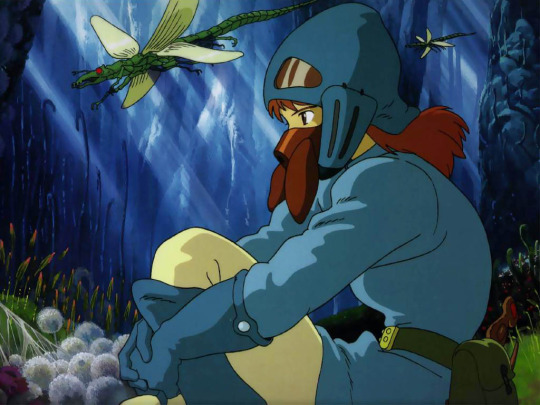
I actually liked this movie a lot. Despite it being a little old, and the animation not being completely perfect, I loved the world and the designs. The regions were uniquely defined, the animals and monster were very distinctive, and I felt that the movie had a pretty decent plot.
To me, it is clear that the large giants that caused the world to become this desolate, post-apocalyptic world, are meant to be referencing nukes, or at least human intervention that leads to the destruction of the Earth. There's very much a very strong theme that the Earth will start to rebuild itself if we let it, and we should not try to interfere in that process. This movie urges the audience to respect Mother Nature because she is very powerful, and I think that having large insects act as the guardians of the Earth was very interesting, since they are typically seen as more basic life forms compared to humans.
Something that I noticed though with this movie is that there seemed to be a little bit of a reference back to the "Wild Child", mainly with the scene where Nausicaa goes on a bit of a rampage after seeing her father has been killed (which totally makes sense, but she was really beating those knights asses). It's interesting seeing how Nausicaa can be overall very gentle and kind, especially when it comes to here interactions with the insects and nature, but then can seemingly turn it on and act like a violent monster with humans.
Overall, I enjoyed the story and I liked Nausicaa as a character. Compared to the rest of the people present in the story, Nausicaa is the only one who understand what is happening to the Earth, and recognizes the importance of protecting nature and the Ohms. She represents people that are conscious of how important nature and our environment is to our own survival, and I believe that the movie definitely tries to urge the audience to be like Nausicaa in order to protect the Earth.
5 notes
·
View notes
Text
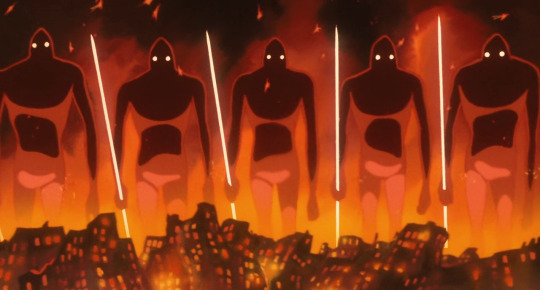
RUMBLING, RUMBLING, IT'S COMING
As with every Ghibli movie I’ve seen, this movie is good, but it didn’t really hit that different. My favorite thing about Nausicaa is seeing the backgrounds and the vast, beautifully-drawn landscapes. It really pulls me into this crazy world where humans do everything they can to survive against vicious insects and a toxic forest.
The movie is a clear reflection of Miyazaki's deep concern for the environment. The toxic jungle in the film represents the environmental crisis that the world is facing, with the overuse of fossil fuels and pollution leading to irreversible damage to the planet. Nature has essentially turned the tables, reflecting how industrialized humanity irreparably damaged the world and destroyed many animals’ ecosystems. Now, humanity must experience the same displacement as many past species that have faced potential extinction.
Nausicaa's character embodies the values of environmentalism. She is a peaceful and empathetic leader who values all life forms and understands the importance of living in harmony with nature. Throughout the film, she works to bridge the gap between humans and nature, finding ways to coexist rather than dominate. The movie also touches on the issue of war and its impact on the environment. The Tolmekian army, led by the ruthless Princess Kushana, seeks to destroy the toxic jungle by any means necessary, including the use of deadly weapons. This blind pursuit of power and destruction is a clear warning against the dangers of militarism and the need for peaceful solutions to environmental problems. Now that I think about it, a lot of Ghibli movies critique war.
8 notes
·
View notes
Text
I'm surprised you saw the movie to be so positive. Honestly, when I first watched it, I thought the final scene was such a slap to the face. The ending just felt so empty when I saw how desolate the world was and how Shinji was choking Asuka. But after having watched this film many times over the years, it still has a very uplifting message
End of Evangelion
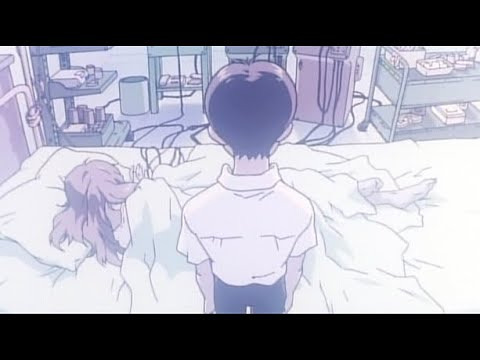
Prank em...
This ending was MUCH BETTER than that of the original anime series. I feel like it did a much better job of looking at the human psyche, specifically people who are beginning to give up on life such as Shinji, and it also made more sense than the mess that was the original anime's ending.
Now don't get me wrong. This movie is weird. Hideaki Anno, is a weird guy. I don't care what anybody says. But, I think that things can still be entertaining while also being weird.
We can see that the Human Instrumentality Project is a plan that merges the consciousness of all humans into one organism, making everyone together. People such as Gendo wish to do it so he can be reunited with Shinji's dead mom. Shinji meanwhile has started to completely give up on life, and wants himself (and everyone else) to perish. But what happens next is interesting. When the Human Instrumentality begins, Shinji changes. Since his consciousness is merged with everyone else, he is able to understand that his perception of others is corrupted by his own self-hate. During this Instrumentality, he determines that life is filled with highs and lows, and that be triumphing over them we are able to fully appreciate our lives. Because of his rejection of this "singular organism", those who has a will to live (a theme brought up earlier in the series), are able to return to their bodies and continue to live out their lives, despite the fact that the Earth has now been ravaged by the outcome of the Third Impact.
It's a very interesting ending, and the cinematography and animation throughout was beautiful. We, the audience, are left with a message of hope, as well as one of urging us to live life to its fullest.
The last thing I'm going to mention is the Christian imagery. I was waiting for it to actually have proper meaning and it finally does! In order to make humanity one singular organism there had to be this sort of merging between Eva 01 (Eve), Lillith (Adam's first wife), and Adam. It's this whole loop that deals with a beginning and an end being together but also different, which I thought was interesting. But the more relevant one in my mind is that Eva 01 is out in space in what looks like a T-pose as a symbol of humanity, following it's actions that saved all of humanity by returning the individual souls of the world back to Earth. A monument to humanity's struggles, and it's past. A symbol that will prevail long after we are gone. That's right, they snuck in a Crucifixion scene.
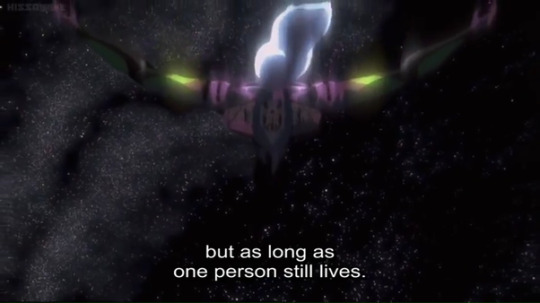
Overall, really interesting and pretty good.
3 notes
·
View notes
Text
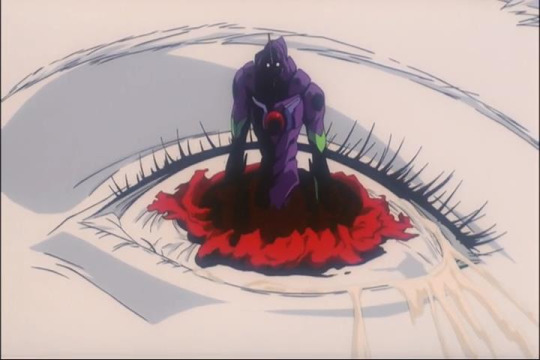
This movie is an absolute masterpiece in terms of every single aspect. Animation, music, story, acting; everything is 11/10. To this day, I still think this movie has some of the greatest shots in all of cinema. Evangelion is a confusing series when you try to think too hard about what’s happening, but at its core, it is very simple: it’s simply about learning to accept oneself and finding meaning in one’s life full of hardships. Even though the series as a whole doesn’t have anything close to a perfect plot, it captures raw emotion so well and shows how complex the human psyche can be.
The first shot in the movie shows an object falling into the water, which is meant to mirror Kaworu’s death in the previous episode. Shinji looks extremely depressed, likely contemplating suicide. Then, the hospital scene in the movie truly shows how broken Shinji has become. All throughout the series, he has never made any decisions for himself, and he has internalized everyone’s else’s hegemonic masculinity, as shown by how he tries shaking Asuka awake and tells her to call him an idiot like always. When he finally exposes her breasts, he finally makes a decision for himself, but having no idea what to do, he resorts to his primal instincts. Not cool, Shinji.
The relationships between parents and their children are also a major theme throughout the series, often depicting the children as a tool to a superior individual. The terrible relationship between Shinji and Gendo is quite evident, but The End of Evangelion also shows Asuka’s relationship with her mother and how it has shaped her personality. In the latter half of the series, we see how Asuka’s pride is shattered multiple times, finally resulting in her catatonic state in the final episodes. But at The End of Evangelion, we finally see a happy moment when Asuka realizes she has been fighting with her mother all along, but it is quickly dashed when she gets absolutely bodied by the mass-production Evas.
7 notes
·
View notes